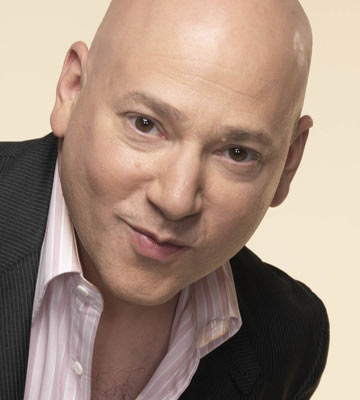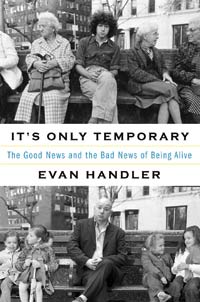Funnyman Evan Handler Reflects on Life’s Lessons
The Comedy of Survival

Evan Handler, perhaps best known as the divorce lawyer-turned-husband of Sex & the City‘s Charlotte York, and whose acting credits also include Lost, The West Wing, and Californication, isn’t supposed to be here. Diagnosed with acute myeloid leukemia and given a very bleak prognosis at the age of 24, his second remission was all but a miracle. Handler beat the odds in a battle against what he’d been told was an unbeatable disease, and lived to tell the tale. And the most surprising part of that tale is how closely it resembles anyone-or everyone’s-story.
More than just an exploration of life after cancer, Handler’s book, It’s Only Temporary: The Good News and Bad News of Being Alive, is really a reflection on surviving life after surviving cancer. Staring down his own mortality so early in life has offered Handler a unique perspective from which to approach those most human of issues (like the meaning of life, the nature of love, the existence of God, the logic of the 27 breakups he’s had with only 10 women), but the stories he shares are most notable for their universality, not their uniqueness. His shockingly blunt and wickedly funny collection of personal essays is written so honestly, in fact, the reader may get the feeling that Handler forgot to worry about what anyone thinks of him-not the people he writes about, nor anyone who might be inclined to pick up the book. But that would be wrong.

“I piss everybody off,” Handler said in a recent conversation. “I didn’t even write about my publishers and they hate me! Actually, the publisher who bought this book read ten of my essays and said that I write like I don’t care if anybody likes me, and I thought, ‘Wow, this is how I write when I really want people to like me!'”
Like him or not, Handler explores everything from love and contentment to gratitude and mortality, from Internet porn addiction to the irony at finally finding true love just as his role on SATC earned him a wild new level of popularity among fans of the female persuasion. He even tackles the boundaries of perception itself, particularly dicey territory for a memoirist. An essay titled “Tiffany ’99, Sotheby’s ’01” begins with Handler selling a returned engagement ring. Wandering around New York afterward, he finds himself in Memorial Sloan Kettering, skulking around like a spy in the hospital where he spent so many dark days-and which he ripped apart in his scathing and very successful monologue which became his first book, Time on Fire: My Comedy of Terrors-when he spots one of the many doctors who’d treated him. He is shocked to see that the man in front of him bears so little resemblance to his memories, and is left questioning all of his recollections of that time.
Handler’s story leaves the reader thinking about the ways in which his or her own memories may be colored. “That’s what memoir writing is about,” Handler said of the essay, “examining these sorts of issues. I disagree with people who say that it doesn’t matter whether things are true or not, though; I’m a stickler for truth and accuracy, and that doesn’t to me at all negate questioning my own perceptions.”
In keeping with the pseudo-Buddhistic implications of such an idea-and the book’s title itself-Handler also ruminates on the question of faith. In “I Don’t Know,” he waxes philosophic about the ultimate question, and those who expect him to have gleaned some sort of existential clarity after having survived his illness (and recovery). But, again, in this essay, we meet our mirror, the everyman who concludes, “It’s not that I don’t wonder, I just don’t know/But what I can tell you is this: I don’t know from an extremely heartfelt place.”
A stage actor first, Handler began writing when he was in the hospital, and would perform his essays at New York City’s Naked Angels Theater Company’s weekly open-mic nights. There, he enjoyed the type of immediate feedback that really only comes with a live audience, and the setting proved an excellent testing ground for what would become his written work.
The advice Handler offers for would-be memoirists is pretty simple. “People want to read what you are least eager to reveal,” he says, “but there’s a way to write it that would make people cringe, and a way that makes people cry or laugh. I sure hope I fall into the better camp there.”
It’s a fine line, but one Handler proves he can walk with the best of them. Temporarily, anyway.
4•1•1
Evan Handler will appear at the Faulkner Gallery of the Public Library, Saturday, September 27 at 12:30 p.m. For more information, call 965-3023 or visit sbbookfestival.org.



